MIGRANTS' STORIES - PART II
Photos & text: Hanna Jarzabek
Y.K. (Syria)
Y.K. a 25-year-old engineer from Syria, had been hiding in the strict reserve of the Bialowieza Forest for several days, which was a highly inaccessible location. I accompanied two volunteers, one of whom was a doctor, to assist him. To reach the hideout, we had to trek 7 kilometers through the forest, navigating obstacles such as fallen trees and treacherous swamps, which posed even greater risks during the winter. It took us 3 hours to reach Y.K.'s location. Upon arrival, we discovered that he was in a critical condition and unable to move on his own. Due to his extremely wet and filthy clothing, exacerbating his hypothermia, we had to change his garments. After two hours of medical care, the accompanying doctor determined that we should call for an ambulance, even if it meant involving the Border Guards.
Y.K. was incapable of remaining in that place and lacked the strength to walk by himself. Our priority was to transport him to a dry and warm location to alleviate his hypothermia. We remained in the forest with him for a total of 7 hours, enduring plummeting temperatures of -11 degrees Celsius. In this time of the year, darkness descends as early as 3 p.m. I was the sole person with phone coverage, and we had depleted our supply of hot tea and food. As mandated by law, the emergency center contacted the Border Guards, who made repeated calls inquiring about our coordinates. Despite providing them with the exact location, they called multiple times claiming they couldn't locate us. At 6:30 p.m., the firefighters arrived, accompanied by the Border Guards. Initially, they interrogated us, and we had to persistently emphasize the life-threatening condition of Y.K. and the urgency of extricating him from the forest immediately. Finally, at 8:00 p.m., the firefighters successfully evacuated him and placed him in the Border Guards' vehicle. According to the latter, the difficult terrain prevented the ambulance from reaching our position. The doctor who had accompanied us insisted on accompanying Y.K. in the vehicle for precautionary reasons, but the Border Guards denied her access. Consequently, we had to make the arduous journey back to the village alone, walking for an additional 3 hours in the darkness. As we departed, the Border Guards callously joked about whether they should call an ambulance for us.
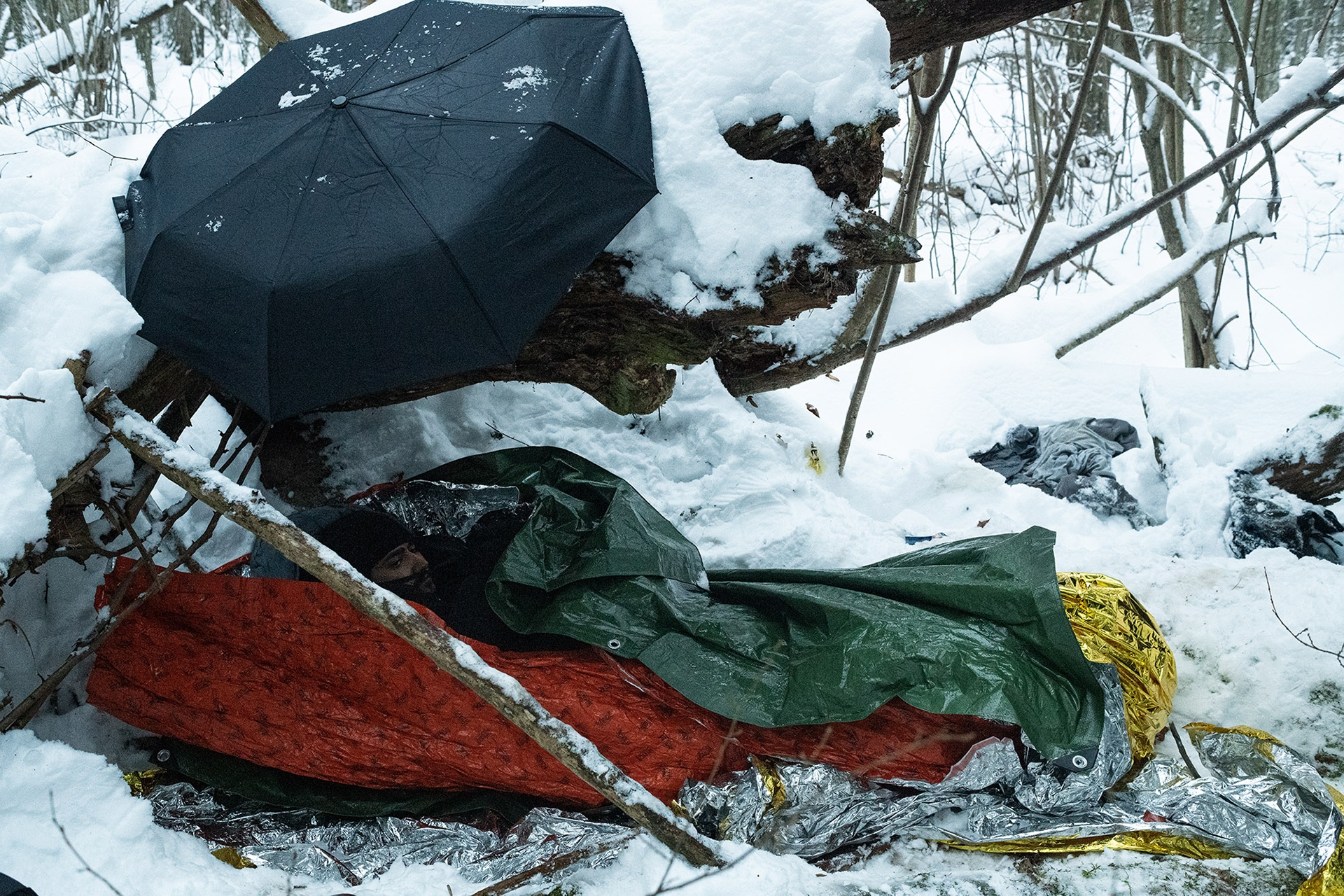
Photo: Y.K. (25 years old, Syrian refugee, an engineer) find in the forest in the second degree of hypothermia. December 12, 2022
The next day, we found out that Y.K. never made it to any hospital. In these cases there is a risk that, once the migrant's health status improves, the Border Guards will pushed him back to the forest on the Belarusian side. According to the doctor, in the case of Y.K. this could cause a relapse into hypothermia and even lead to his death. To make sure it would not happen and to obtain information about his situation, I had to request the parliamentary interventions from several deputies.
Parliamentary intervention is a tool that allows a deputy to ask a series of questions to which public institutions are obliged to respond. Following these interventions, in which my presence as a photojournalist who documented the entire situation in the forest was also revealed, the Border Guards published a statement assuring that Y.K. was in good condition, that his request for asylum had been accepted and accusing volunteers of misinformation. Later on Y.K. was transferred to a Center for the Internment of Foreigners (CIE) where he had to wait for the judge's decision on his asylum request. Without making the case public, he probably would have been pushed back to the forest, as has already happened in several similar cases.
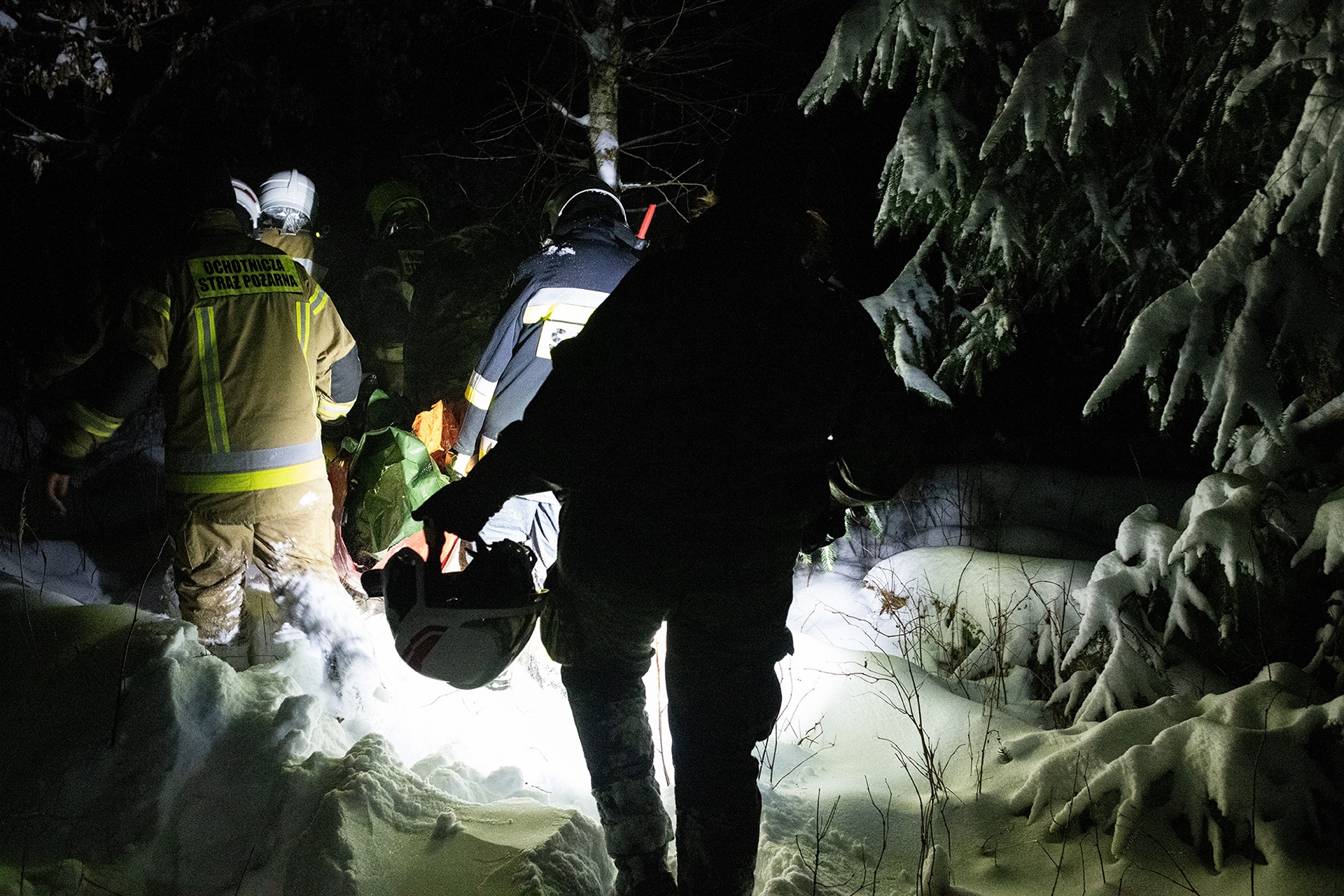
Photo: The firefighters and Border Guards transport Y.K, a Syrian refugee with second degree of hypothermia. Bialowieza Forest, December 12, 2022
AKRAM & MOHAMMAD
(Yemen & Syria)
Akram (32, Yemen, an oncologist) and Mohammad (50, Syria) met on the road. When we found them, they had been in the forest for 5 months. The first question Akram asked us was: "Can you take us with you?" We had to explain to him that we couldn't do it and that transporting them in a car could cost us 8 years in prison for human trafficking. Both were exhausted, Mohammad told us that they had not had drinking water for several days. They drank what they found in the swamps, filtering it through a scarf. At one point I asked Mohammad where he wanted to go, whether he wanted to try to claim asylum in Poland or go to another country. He looked at me and said, "I don't care. I just don't want to die here, you know?"
When the volunteers received their request for help, it was already a night. Night interventions are usually even more complicated because there is more risk of being discovered. This time I accompanied two volunteers, one of whom knew the terrain relatively well. In general at night the volunteers move in the dark and only if necessary they use very low intensity headlamps. Going towards the refugee hideout, at one point we heard a car and one of us saw lights in the distance. At this time in the middle of the forest it could only be the Border Guard. We fall to the completely wet ground and hide our faces among the foliage, thinking that if they have thermo vision, we are lost. At this moment, it is no longer the question of what will happen to us but, if they find us, they will realize that there are some refugees nearby. The burden of responsibility at that moment is very heavy. You know that the people who called for help are there waiting for you and trusting you and the last thing you want is to expose them to a risk of pushback to the Belarusian side.
We had a hard time finding them but we finally got them. Then the typical thing begins: you try to collect as much informations as possible in less time, also paying attention not to speak loudly or put on too much light. We used only the light from headlamps but even so, Akram was clearly scared and was asking us all the time if we can turn it off. Sometimes the volunteers ask the refugees to sign a paper granting the power of attorney to the volunteers. Thanks to this paper, the volunteers can try to follow the situation in case a refugee is arrested. Otherwise, sometimes those who are arrested disappear without anyone being able to identify their destination. But on many occasions the Border Guards refuse to provide any information even if the volunteers have the signed legal power of attorney.
There are many things that are difficult in this type of intervention: the situation is surreal; the feeling of responsibility is combined with the one of impotence. But I think the most difficult thing is that at a given moment you have to get up and leave, leaving these people in the middle of the forest without knowing what will happen to them in the next few days. Akram and Mohamad called for more help the next day. Another team brought them more food and then they realized that Mohammad had a broken rib. According to my sources, some locals helped them cross a section of the forest and a few days later we found out that they were both safe in Germany.
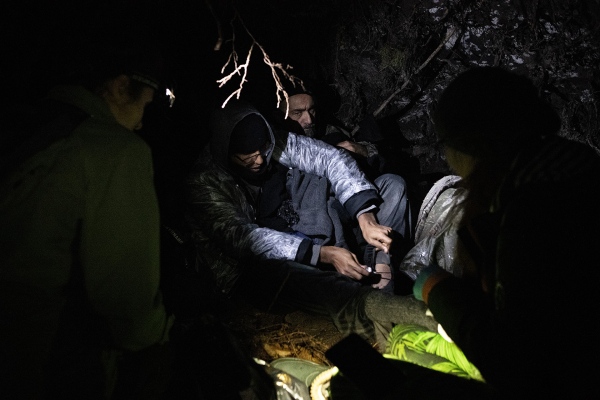
Photo: Akram and Mohammad helped by the volunteers. October 23, 2022
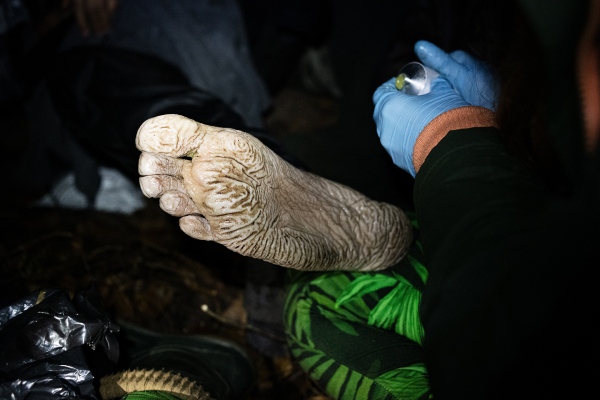
Photo: Trench foot, a frequent health problem among refugees trying to cross the Bialowieza Forest. October 23, 2022
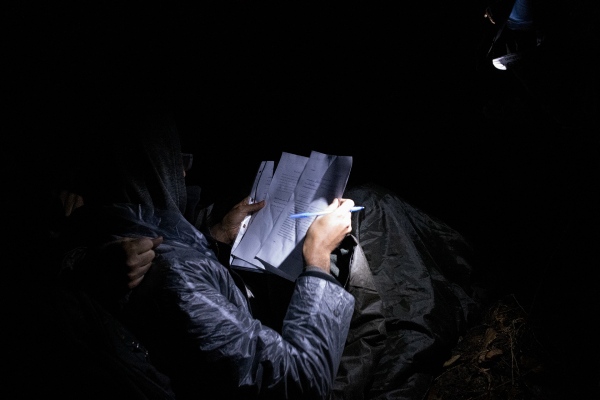
Photo: Akram signs the power of attorney to the volunteers. October 23, 2022
Fatima (name changed),
Iranian, 30 years old
While in Iran, she participated in protests and was subsequently placed on the country’s blacklist, prompting concerns for her safety. An interpreter who worked on her case stated that "there is not a single square meter in Iran where she would be safe."
With her husband and a friend, she set off on a journey and attempted to cross the Polish-Belarusian border for the first time in December 2022. However, they were immediately pushed back by the Border Guard to the Belarusian side and received orders to leave Polish territory, along with a ban on re-entry. During their next attempt to cross the border, they were stopped by the Polish Border Guard and allegedly subjected to physical violence and pepper spray, according to Fatima.
Overcome with fear, Fatima lost consciousness, and when she came to, she found herself in an ambulance en route to the hospital. Her husband and fiend had been pushed-back to Belarus. She was alone and confused. Although she had no fractures she was still shaken and disoriented, unable to communicate effectively due to her lack of knowledge of languages other than Farsi. Her concern for her husband was compounded by her ignorance of his whereabouts, and it was only later that she learned about his forced return to Belarus.
Testimonies from those assisting refugees in the forest indicate that family separation by the Border Guard during push-backs remains a frequent occurrence. A resident of the area, aged 54, underscored this point, stating that “They separate families without hesitation in various seconds, whether it’s a mother with two children or a father with three children. It has become the norm.”
Fatima applied for international protection, which had to be processed because she was able to sign a power of attorney at the hospital, authorizing volunteers to represent her case. According to reports from both refugees and volunteers, many requests for international protection are ignored by the Border Guard. However, when a representative submits an application on behalf of a refugee, it is documented, increasing the chances of acceptance and transfer to the Office for Foreigners for consideration. This information comes from both refugees and volunteers who have experienced the process.
As per standard procedures, after being discharged from the hospital, the Border Guard took administrative actions against her, including confiscating her passport and determining whether she would be placed in a Closed Center for Foreigners or in an Open Centre. In the case of the former, a court order for restriction of liberty is required. Fortunately, Fatima possessed all the necessary documentation to be placed in the Open Centre. However, given her fragile mental state, she required temporary accommodation, which was provided by local hospital volunteers who often act as proxies for refugees in need.
Fatima is currently awaiting a resolution to her case at the Office for Foreigners. It is difficult to estimate how long this process may take, as it can sometimes take up to six months. In the event of an unfavorable decision, she may appeal to the Voivodeship Administrative Court in Rzeszów, which further extends the time it takes to resolve the case.
Volunteers who are providing housing for Fatima have emphasized that she is deeply attached to her husband and is understandably fearful. She is uncertain about when and where she will be able to see him again.
Photo below: Another Iranian woman attended by a volunteer doctor in the Bialowieza Forest. March 18, 2023
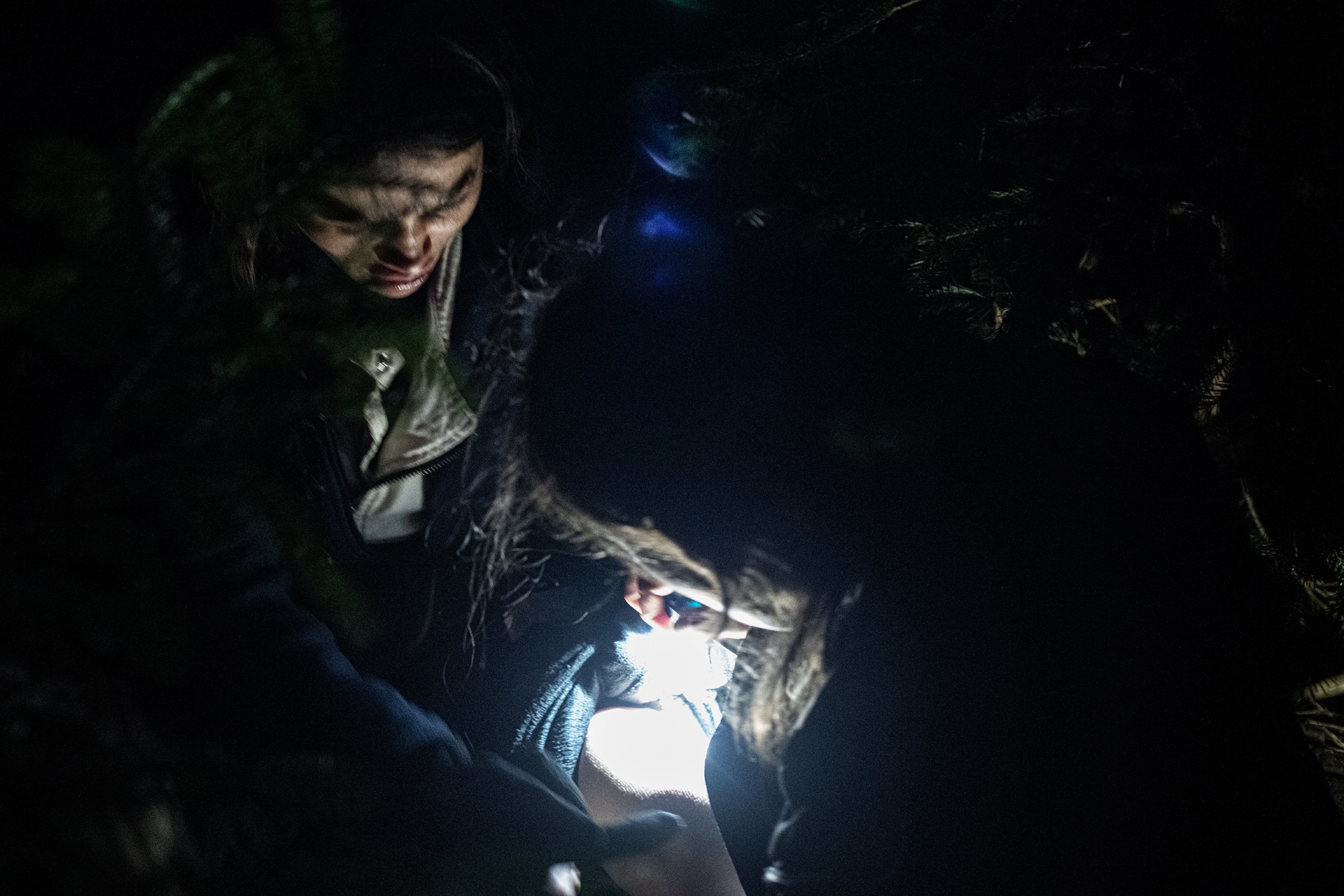
AHMAD & BAYAN
(Syria)
Ahmad, a 24-year-old physiotherapist, and Bayan, a 25-year-old who studied something related to medicine, originated from Syria. They crossed the border between Belarus and Poland for the first time, thus still being in good physical condition. Their clothes were damp because, as they explained to us in broken English, they had crossed the border by crossing a river. Ahmad mentioned that the water had reached up to their chests. Bayan was trembling upon our arrival and had to change clothes immediately. Their intention was not to stay in Poland; they aimed to reach Germany.
The majority of migrants do not wish to remain in Poland but rather hope to reach Germany or another European country. Generally, they arrive unprepared and unaware that, according to European law, they must seek asylum in the first European Union country they set foot in. Some individuals apply for asylum in Poland when apprehended by Border Guards, even though they are fully aware that they want to proceed to another country. Failure to do so results in the Border Guards pushing them back into the forest on the Belarusian side, thus forcing them to attempt crossing the border again. Consequently, some find themselves trapped in this situation for months, enduring numerous pushbacks, while exposed to extreme conditions, limited access to clean water and food, and during winter, facing a high risk of death from hypothermia.
Typically, when the refugees are not in critical condition and are relatively well, volunteers aim to spend as little time as possible in the forest, reducing the risk of attracting attention through noise or movement. During our brief time together, Ahmad expressed his gratitude profusely, even taking out small jars of perfume from his backpack that he had brought from his country, intending to give them to the people who had helped him along the way. As night began to fall, he became increasingly concerned about our return through the forest. It was one of those situations where you struggle to find the right response, realizing that the person who must stay there, sleeping in the forest and evading the Border Guards, is worried about your safe return to a warm home.
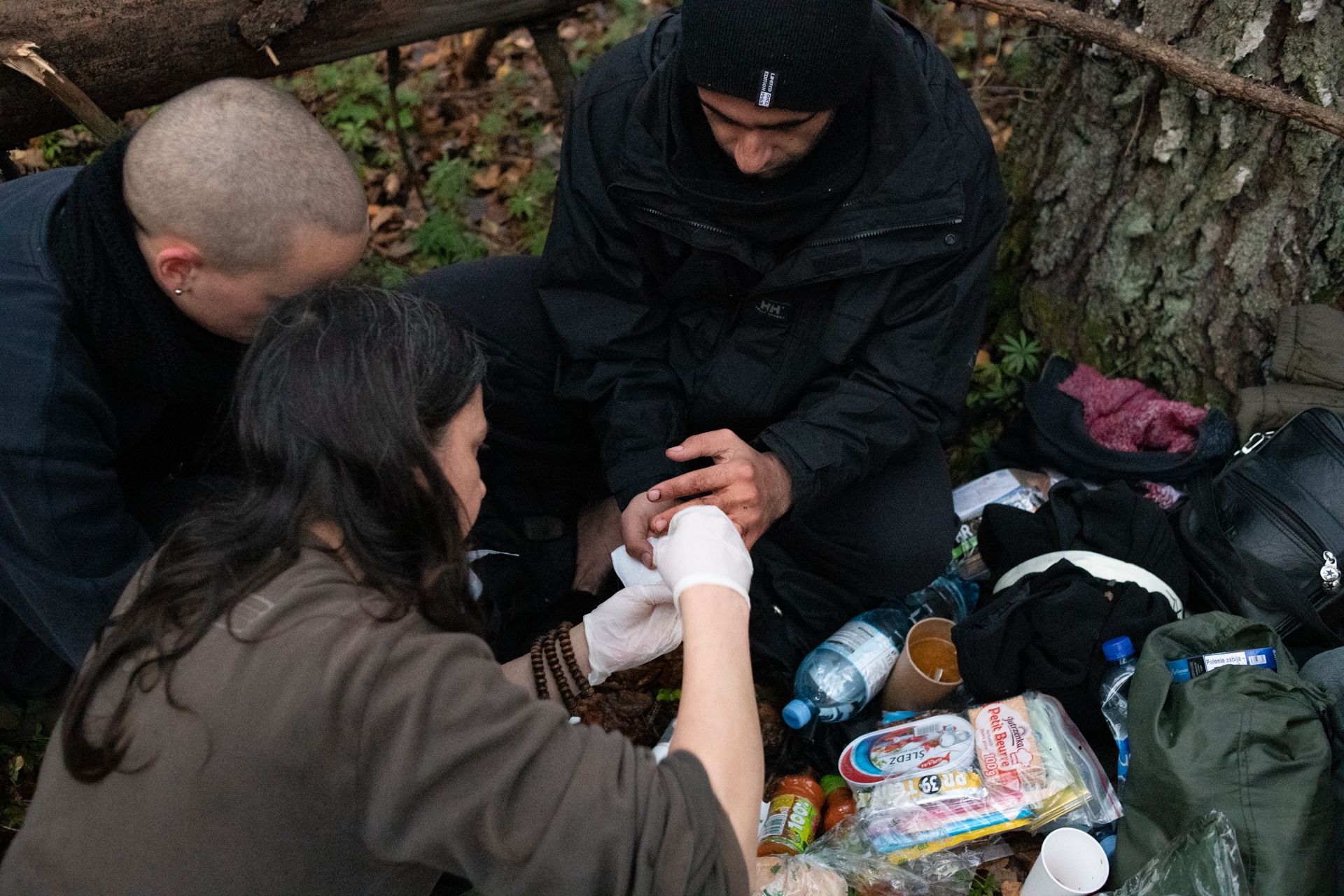
Photo: Two Grupa Granica volunteers care for the wounds of Ahmad, a Syrian refugees hiding in the Bialowieza Forest. October 31, 2022
MOHAMMAD
(Yemen, 30 years old)
Mohammad came from Yemen to Russia and then to Minsk with his two friends, Khalid and Salim, both of whom were 23 years old. They had been in the forest for two months and had already been pushed back to the Belarusian side twice by the Polish Border Guards. The first time, the Polish Border Guards smashed their phones and sprayed tear gas in their eyes. Khalid said he couldn't see anything for a couple of hours. This time, they crossed the border by climbing over the fence with a ladder and then slipping down the Polish side. The Belarusian guards attacked them, and Mohammad had marks on his head and eyes for a long time.
Despite the fact that a wall has been built and the forest is difficult to cross, this route is still considered the safest and easiest way to reach Europe. However, migrants often do not know what type of forest they will have to pass through and are not adequately prepared. Some call the forest "the jungle."
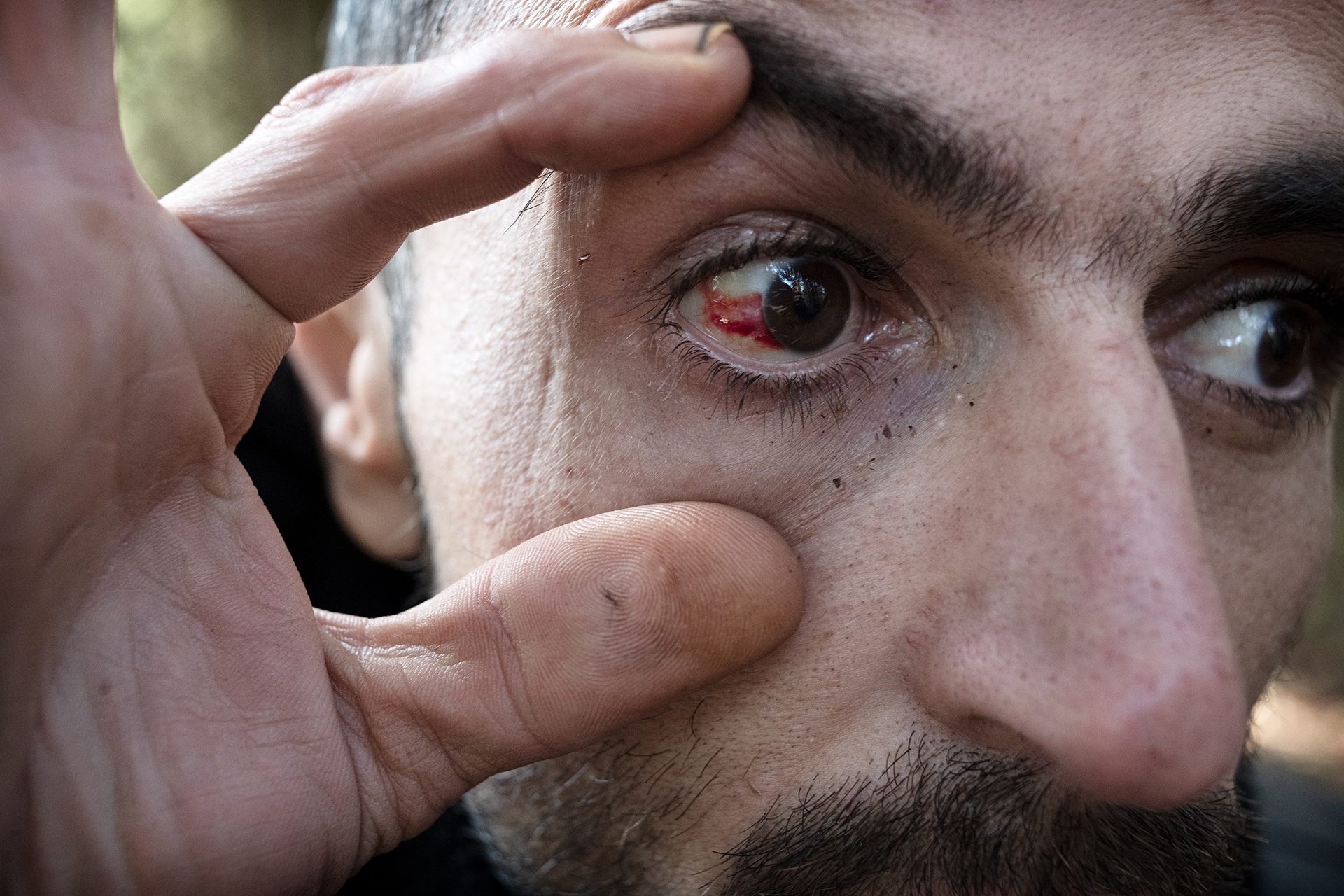
Photo: Mohammad (30 years old, Yemen) shows his injuries (as a result of beatings he received from the Belarusian police). November 4, 2022
ALI
(Syria)
Ali (24 years old), was part of a group of 8 people, all from Syria. One of the common challenges encountered while assisting migrants in the forest is communication, as was the case with this group. Frequently, these migrants do not speak English, and due to limited coverage, online translation is not possible.
Ali appeared extremely fatigued, and from what we gathered, he had not eaten or drunk anything for 6 days. Refugees often lack access to clean drinking water and are compelled to collect water from swamps, which can pose health risks due to contamination by animals. Consuming such water can lead to diarrhea, poisoning, or severe digestive problems.
Almost all of them had damp clothes, and one individual, who was seated with his back against a tree, seemed to be experiencing low blood pressure or possibly a blood sugar issue. Unfortunately, there was no doctor present among us to determine the exact problem. In such situations, if there is coverage, volunteers attempt to contact the base to connect with a doctor or lifeguard and assess the type of assistance that can be provided, potentially avoiding the need for an ambulance. These are challenging moments, as in a short amount of time, in the middle of the forest and without expertise, it becomes necessary to determine whether the person can survive without professional medical aid. Calling an ambulance would attract the attention of the Border Guards, leading to either arrest or a pushback to the Belarusian side. The Border Guards had already detained Ali on seven occasions, and each time he was pushed back into the forest on the Belarusian side. He quickly consumed his food while attempting to explain, in his weary weak voice and limited English proficiency, how he was feeling and, above all, how much he appreciated our help.
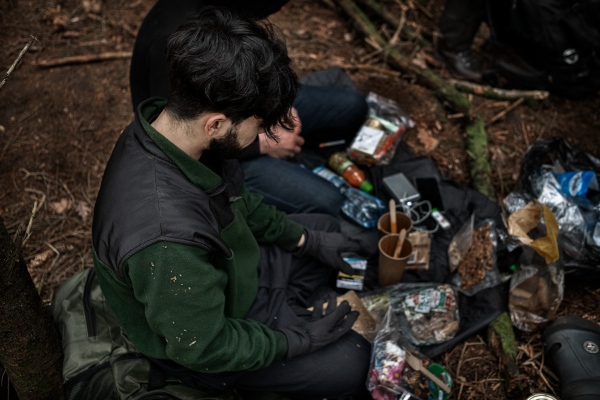
Photo: Ali (24 years old, Syria), with food and clothing provided by volunteers from Grupa Granica. November 1, 2022
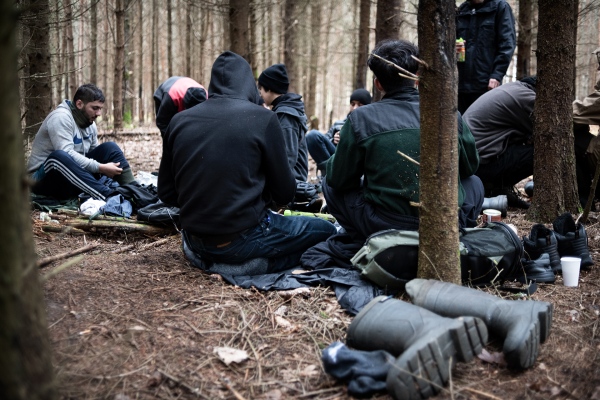
Photo: A group of 8 refugees from Syria, with food and clothing provided by volunteers from Grupa Granica. November 1, 2022
A.
(Yemen)
A. (25 years old, from Yemen, preferring to remain anonymous) attempted to cross the border with her brother and a friend. Unfortunately, she slipped off the fence and broke her leg in the process. Her brother attempted to carry her on his back but was unable to do so for an extended period. The group was apprehended by the Border Guards in the forest, and A. was taken to the hospital for medical treatment. It is likely that her brother and friend were pushed back to the Belarusian side.
At the hospital, A. had to undergo a complex operation due to the severity of her leg injury. She even required a blood transfusion, and according to the doctors, she will never fully regain use of her leg. Her ultimate destination was Norway, where her husband resides.
At the hospital, A. had to undergo a complex operation due to the severity of her leg injury. She even required a blood transfusion, and according to the doctors, she will never fully regain use of her leg. Her ultimate destination was Norway, where her husband resides.
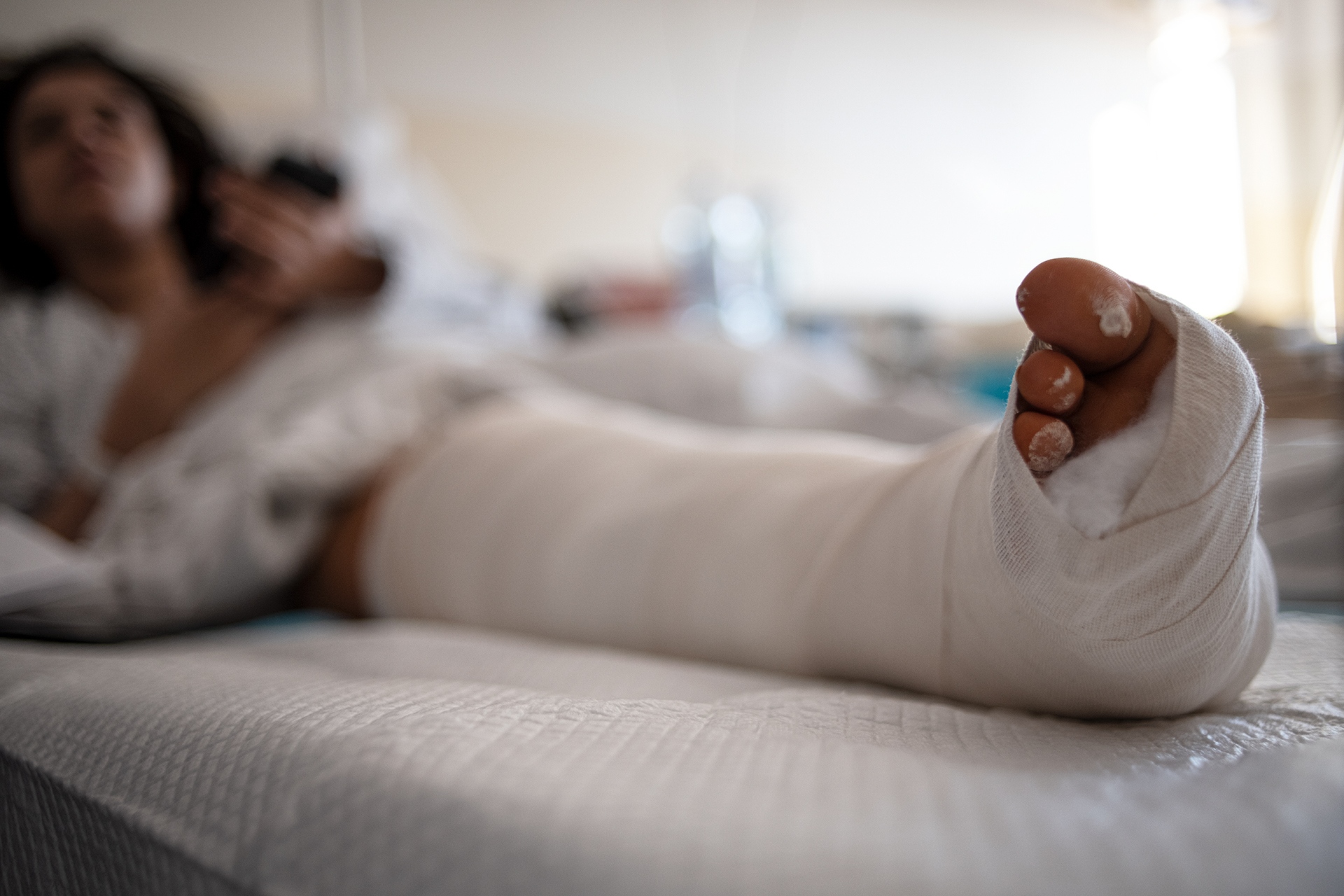
Photo: A. (25 years old, Yemen, wanted to remain anonymous) hospitalized after broking her leg while crossing the wall at the border; December 18, 2022